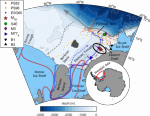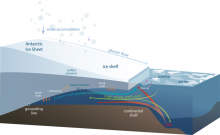The potential collapse of the Antarctic Ice Sheet in a future, warmer climate and the consequent dramatic rise in sea level would cause flooding of large, densely populated areas. The Fifth Assessment Report of the Intergovernmental Panel on Climate Change identified the Antarctic Ice Sheet as the largest source of uncertainty in predictions of future sea level rise over their 50-200 year time horizon.  The observed accelerating thinning of many of the ice-shelves surrounding and buttressing the Antarctic Ice Sheet is linked to increased oceanic heat fluxes, but the dynamics governing the flow of warm water towards and into the ice shelf cavities are poorly known. By improving the general understanding of these dynamics and the factors controlling the heat flux towards the ice shelf cavities, the proposed project will contribute to reduced uncertainties in sea level rise projections.
The observed accelerating thinning of many of the ice-shelves surrounding and buttressing the Antarctic Ice Sheet is linked to increased oceanic heat fluxes, but the dynamics governing the flow of warm water towards and into the ice shelf cavities are poorly known. By improving the general understanding of these dynamics and the factors controlling the heat flux towards the ice shelf cavities, the proposed project will contribute to reduced uncertainties in sea level rise projections. 
We propose a set of experiments to explore the effect of these topographical barriers on the flow of warm water from the deep ocean into the ice shelf cavity. The experiments are to be carried out in the CORIOLIS rotating platform at LEGI, where topography representing the Antarctic continental shelf – ice shelf system is to be inserted. 
Barotropic and baroclinic currents will be set up using pumps and the evolution of stratification and circulation studied using Laser Induced Florescence (LIF) and Particle Image Velocimetry (PIV), respectively.
Elin Darelius & team’s blog: https://skolelab.uib.no/blogg/darelius/
Project leader :
- Elin DARELIUS : Geophysical Institute, University of Bergen
- Anna WAHLIN : Department of Marine Sciences, University of Gothenburg, Sweden
Members :
- Mirjam Sophia Gleßmer : Hamburg University of Technology, Germany
- Jean-Baptiste Sallée : LOCEAN-ISPL Paris
- Karen Assmann : Department of Marine Sciences, University of Gothenburg
- Nadine Steiger : Geophysical Institute, University of Bergen
- Lucie Vignes : LOCEAN-ISPL Paris
- Svenja Ryan : Alfred Wegener Institute
- Arian Jenkins : British Antarctic Survey
- Laura Herraiz - Borreguero : National Oceanography Centre, Southampton
- Taewan Kim : KOPRI, Republique of Korea
- Céline Heuzé : University of Gothenburg
- Ho Kyung Ha : Inha University, Republique of Korea






